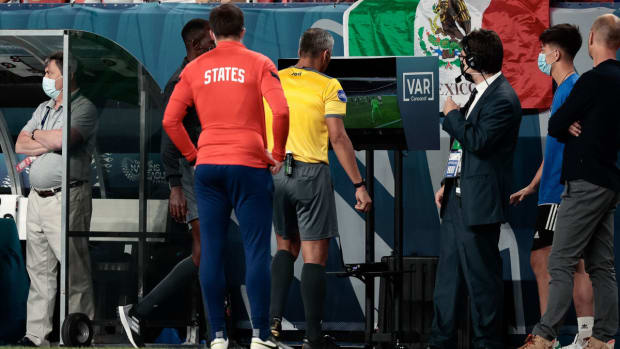Concacaf's qualifying process typically includes a little bit of everything, but VAR won't be part of it on the road to Qatar 2022.
Concacaf World Cup qualifying typically has a little bit of everything. But there's one element that will be missing on the road to Qatar 2022, and it's one that doesn't sit well with U.S. men's national team coach Gregg Berhalter.
There will be no video assistant referee (VAR) throughout the qualifying process, despite Concacaf having it implemented in its other, recent competitions. Concacaf released the following statement on Thursday, just before the start of qualifying, explaining its reasoning.
"The Concacaf region FIFA World Cup Qualifiers are FIFA matches subject to FIFA regulations. A key criteria determining whether VAR could be used in this competition is for the technology to be currently available, in certified stadiums, for the matches of each of the participating federations. In the final round of the Concacaf region FIFA World Cup Qualifiers, five of the eight competing federations do not meet this criteria.
"Despite the challenges of the public health situation, in March 2021 Concacaf successfully trained a new pool of referees in order to fully implement VAR for centralized Confederation competitions, including the Concacaf Nations League Finals and the Concacaf Gold Cup."
Given that VAR implementation is an all-or-nothing venture in a competition—you can't have some matches with it and some without—only three federations being able to support it means it's off the table, but that's a significant development in a region that's become synonymous with things often going awry.
"I think that's an error. I think it’s an error by Concacaf. I’m going to speak freely and say that," Berhalter said in his prematch press conference before Thursday night's opener in El Salvador. "That’s part of the game, VAR, I think it was great that they implemented it in Nations League and Gold Cup, and it's disappointing that it's not part of qualifying. That's where the modern game is going. We want to be right up there with the rest of the world, our region, in terms of the quality and the technology and we need to find a way to get that done. I'll say that's disappointing, but it's going to be no VAR for all the teams involved. So we’ll deal with it and we’ll get on with it."
The U.S. is looking to return to the World Cup for the first time since 2014, and being able to mitigate officiating errors or more typical Concacaf shenanigans from the equation would certainly be helpful in that regard.
The U.S. did not fail to qualify for the 2018 World Cup due to a lack of video replay or technology, for what it's worth (and it managed to qualify for the previous seven without them also). The underlying issues and consistent lack of quality over 10 games were to blame for that. But even with everything that had transpired before and during the fateful night in Trinidad & Tobago, had the use of technology been present in October 2017, there's still a chance the U.S. could have punched a ticket to Russia. In a separate match, Panama scored what wound up being a phantom goal in its finale vs. Costa Rica that tied the game at the time. Blas Pérez's ball did not fully cross the line despite the goal being given. Had technology been in place, it surely would not have stood. Nobody can accurately project how the rest of the match would have gone had that goal been disallowed, but Panama went on to win on Román Torres's late strike as part of a sequence of events that forced the U.S. to miss out.

Isaiah J. Downing/USA TODAY Sports
VAR factored heavily into the Concacaf Nations League final this past June. In extra time, both the U.S. and Mexico were awarded penalty kicks after video reviews—Mexico coach Tata Martino was even red carded for putting his arm around the referee when he was checking the pitchside monitor on one occasion—with Christian Pulisic converting his and Andrés Guardado having his saved. Had those plays occurred during World Cup qualifying, the initial calls on the field would have stood.
It's a game-changer for players, coaches and referees who over the last couple of years have become accustomed to operating with the safety net in place, no matter how criticized its implementation has been in some leagues and corners of the world. And it's just another wrinkle to what's already a minefield of a qualifying process.
More Soccer Coverage: